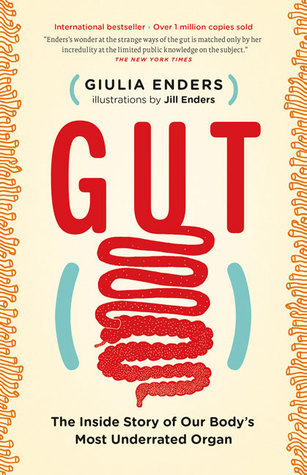It turns out that we were on to something with expressions like "my gut tells me" and "I just have a gut feeling." As I first read in

last year, our bowels have a mysterious emotional connection to our brain, producing 95% of our seratonin, for example. And there's a reason nervousness gives us butterflies in our gut, not our brain. We ignore our guts at our peril, in terms of our emotional health.
Well, this December I picked up another book on the under-appreciated gut:

The cover makes it sound like a diet book, but, really, the authors, who hail from Stanford, give a great laymen's background on our gut and its bacterial population. Yes, they give some tips for improving gut health, which I'll get to, but first they just have plenty of fascinating information to share.
First off, whether or not you have the gift of hospitality, your body hosts bazillions of bacteria. On your hand alone "there are more microbes present...than there are people in the world." For germaphobes, this news might freak them out, but the Sonnenburgs want us to know that the bacteria our bodies have learned and evolved to live with are largely helpful. It's only when the helpful little guys are absent or decimated that the few bacterial villains gain a toehold and make us very, very sick. Our "gut flora" help us extract nutrients from food, bolster our immune system, and communicate with our brains. They can even determine if we tend toward leanness or obesity! When the populations of various bacteria are underfed, they might go extinct (freeing up more gut space for harmful bacteria) or start eating the mucus lining of our large intestine, destroying the protective layer between everything coming into the body and the bloodstream.
In our modern Western world,
Four factors have greatly changed gut flora in individuals in our population over the past few decades. They are: 1) increasing consumption of industrialized, processed foods, 2) widespread use of antibiotics, 3) the alarming rise in Caesarean deliveries, now accounting for one in every three births, and 4) the decline in breast-feeding.
What happens when our gut flora get out of wack?
Dysbiosis, or microbial imbalance, is observed in people with a variety of health problems such as Crohn's disease, metabolic syndrome, colon cancer, and even autism. In fact, it is getting more and more difficult to find a health condition that has not been linked to aberrations within the microbiota.
The authors are careful to emphasize that correlation is not causation, and they go carefully through the data (mostly on mice studies at this point), but certainly promoting gut health wouldn't make any of those conditions worse and would probably yield related and unrelated benefits. There's absolutely nothing to be lost in promoting gut health.
Some circumstances we can't help, like being born by unexpected C-section, but the authors ensured that their C-section daughters received a good swabbing with mom's birth canal bacteria, since that first essential exposure populates the infant's clean system with tried-and-true good flora. Breast milk further provides some incredibly complex carbs too expensive to reproduce in the lab, feeding those good bacteria and ensuring that they flourish. If you missed both those boats with your kids, despair not, but do try to keep them off the antibiotics when possible, since "antibiotic use in children is associated with an increased risk for a number of ailments such as asthma, eczema, and even obesity." Similarly, antibiotic used in adults usually wipes out plenty of the healthy bacteria along with the culprits, leaving us vulnerable to the bad guys taking hold and creating super bugs. (Wonder why old folks are so vulnerable to food-borne bacterial infection? Aging decreases the variety of our gut flora!)
The good news is, we can impact and maintain the health of our gut flora with a few key decisions. With these in mind, I came up with my 2017 New Year's Resolutions.
- Eat plenty of fruits and vegetables--for the fiber! No matter what health/wellness book you read, there's no escaping this one. All that natural fiber keeps our flora hard at work, keeps them from eating the mucosal intestinal lining, and reduces inflammation.
- Ditch the refined flours. In order for our flora to have something to eat and break down and work on, they need food that doesn't turn instantly to sugar before it even gets to them. Go whole grain. Watch for "glycemic load."
- Reduce the meat a little. I'm looking at you, Paleo dieters. This one will be tough with us because I have a teenage son who needs the protein and is constantly starving.
Several studies show that a meat-centered diet impacts the microbiota in a way that is detrimental to health. Within four weeks, dieters on a high-protein, reduced carbohydrate regimen had a dramatic increase in both the amount of [short chain fatty acids] and fiber-derived antioxidants they produced and a buildup of hazardous metabolites in their colons. This type of environment would negatively affect long-term colon health by increasing the risk for inflammatory diseases and colon cancer.
Finally, you may wonder if consuming probiotics helps. All the marketing gimmicks aside, consumption of live-culture yogurt, kefir, buttermilk, etc. increases the number of transient bacteria moving through your system, and "there is evidence that the presence of probiotic bacteria passing through us reinvigorates our body's defenses against invading pathogens." Not bad, for tourists. They also promote the secretion of that glorious, protective intestinal mucus. So let's say, as a last Resolution:
4. Add some probiotics to the diet.
I'm headed to the store to pick up some yogurt and maybe some kefir to experiment with. I'll keep you posted.




